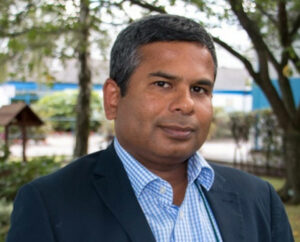Meet Shaji Sebastian
Professor Shaji Sebastian is the IBD Service Lead at Hull University Teaching Hospitals, and is the Chair of the BSG Research Committee since September 2021.
What attracted you to a career in gastroenterology/hepatology?
When I was a young medical doctor, what mainly attracted me to gastroenterology was its diversity - you can have everything including looking after acutely ill patients, as well as patients with chronic illnesses and also enjoy carrying out technical procedures like endoscopy. Subsequently, I went on to focus mainly on inflammatory bowel disease which has been my main area of clinical and research interest for close to 20 years now. Early on in my career, I saw lots of patients with IBD for whom we couldn’t do a great deal. They had limited therapeutic options and there were a lot of unmet needs. The researcher in me kept questioning this and thinking collectively can we work on this. That’s how that chronic diseases part of gastroenterology became my focus in gastroenterology and that’s where I am at the moment.
What advancement in gastroenterology/hepatology are you most excited about and why?
Many of them! Right now, I would say what is really exciting to me is the development and the potential of future applications of artificial intelligence in gastroenterology. People may think of AI as very challenging or even a threat in some cases, but for me I see it as a huge opportunity to make our lives easier and as something which may aid us in improving care for our patients. For example, using Natural Language Processing to make better sense of data and simplify its interpretation and presentation, or using AI to give you real-time feedback in relation to your interpretation of an image in a colonoscopy. I also see it as an opportunity to answer the questions that we have, such as relating to the unmet needs in IBD patients using large datasets of omics data. I think it will be a massively helpful tool in gastroenterology, and specifically in IBD I think it’ll have a huge role to play in the future.
What do you enjoy most about your work?
Definitely the people! The people who I work with, particularly in my field, it’s all about teamwork and collaboration. There is teamwork at a hospital level like working with the MDT, IBD nurses, surgeons, radiologists, pathologists, dieticians etc so this is where it starts. I’ve also been very fortunate to be involved in lots of collaborations with fantastic colleagues across the world in my field. These collaborations have really broadened my outlook and horizons by listening to different experiences and different solutions to problems faced by IBD patients. Perhaps equally importantly, if not most importantly, is the teamwork and collaboration with patients because in IBD, which is a chronic disease, you basically grow up with these patients. I have people who I started looking after when they were in high school or doing their A-levels and some of them are now my own professional colleagues and collaborators doing the same thing that I do in various parts of the world. I have actually grown up with them and they are part of my journey and I have been a small part of their journey and that is really what keeps me motivated in what I do.
What is the one thing you would change?
I wish I had the influence and ability to change some aspects of academia - I think there is still a lack of inclusion, and transparency in GI academia. It is getting better but it’s nowhere near where it should be. Key opinion leaders drive a lot of changes but not always based on credibility, transparent and full data or experience. Sadly, there is only lip service actions in presentations and publications in relation to transparency and openness about conflicts of interests.
What’s the best advice you’ve been given in your career?
I remember one of my mentors told me that you should never stop doing your best just because somebody doesn’t give you the credit you deserve for doing it. It shouldn’t stop you doing from what you feel is the best you can give.
What does being a BSG member mean to you?
I would again say teamwork and collaboration, it is a community and I do feel that it is a growing and more inclusive community lately. There are members who bring different strengths to the organisation and that means mutual appreciation, engagement, and mutual learning. Specifically for me as a BSG member and now one of the officers, I make changes where possible to make the UK gastroenterology community more inclusive and more transparent in what we do. That way, we can tackle the challenges facing our patients as a collective inclusive community, create more solutions, and share the successes .
If you are interested in taking part in our Meet our Members initiative, please contact the BSG Communications team.
